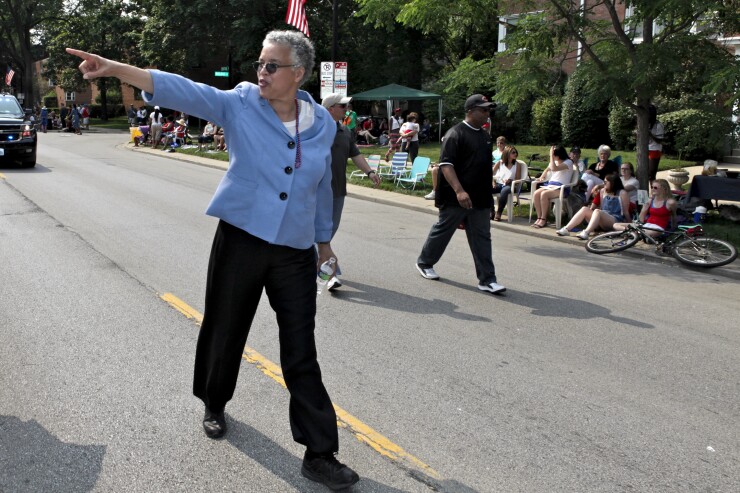Cook County, Illinois, President Toni Preckwinkle says no new taxes or other new revenues are needed to close the lowest projected budget gap since she took office eight years ago.
The

“We have come a long way since I walked in the door to a gap of nearly $500 million,” Preckwinkle said in a statement Thursday. “This marks the smallest gap we have ever experienced…the manageable size of this preliminary gap and year-end projection means we will not be asking residents for new revenue.”
That’s good news for local taxpayers, as the state is raising the motor fuel tax and other transportation related fees to fund a capital budget and will ask voters next year to approve a shift to a graduated income tax in order to raise taxes on top earners. Chicago’s new Mayor Lori Lightfoot has said new revenue will be needed to address rising debt, pensions, and personnel costs in 2020.
Announcement of the county’s anticipated fiscal 2019 results for its general fund and health enterprise fund and the preliminary budgetary forecast kicks off budget season. The county expects a $14.9 million surplus over budgeted amounts this year.
A public hearing is set for next month and Preckwinkle this fall will unveil a budget for the fiscal year that begins Dec. 1. Passage is expected in November.
The county has cut its deficits by whittling down its structural imbalance through 1,500 in job cuts, refinancing and reducing debt levels by 11%, and across-the-board spending cuts. Preckwinkle in 2017 turned to a tax on sweetened beverages that the board rescinded later in the year after a public backlash. That drove further cuts as the tax was expected to generate $200 million annually.
The projected general fund shortfall is due primarily to rising personnel costs due to cover a cost of living pay hike and increased health care expenses. An additional $4.7 million in projected revenues helps offset growing costs, leaving the general fund gap at $11.9 million. The health enterprise fund projects a $6.8 million shortfall.
The budget will incorporate ongoing supplemental contributions to the county’s pension system which will collectively total $1.3 billion since the county raised the sales tax in 2011 primarily to fund those supplemental payments that are moving the county closer to an actuarial level. Some of the $391 million of annual revenue generated by the higher tax also goes to pay for transportation work.
The 2020 budget or future ones will see some new revenue from recently approved state measures. They include $3.3 million from recreational cannabis sales beginning in January, $3.2 million from new casinos, and $3.3 million from sports betting. The size of revenues from new collections of online sales taxes is uncertain.
Preckwinkle won a third term last November. She launched her campaign to run for mayor in the February 2019 election after Rahm Emanuel announced he would not seek a third term. She made the runoff cut but lost to Lori Lightfoot in the April contest.
Persistent pension pressures prompted S&P Global Ratings to
S&P Global Ratings cut Cook County’s sales bonds three notches to AA late last year, affecting about $416 million of debt. The county last year asked Kroll Bond Rating Agency to rate the revenue bonds. Kroll assigned its AAA rating.
Cook Chief Financial Officer Ammar Rizki said earlier this month use of the securitization structure launched by Chicago in 2017 is on his radar due to the hits revenue bonds have taken as rating agencies move to align ratings closer to an issuer’s general credit in the aftermath of Puerto Rico bankruptcy rulings. State legislation would be needed to extend to county governments the securitization structure established in the 2017 legislative session for municipal home rule units.





